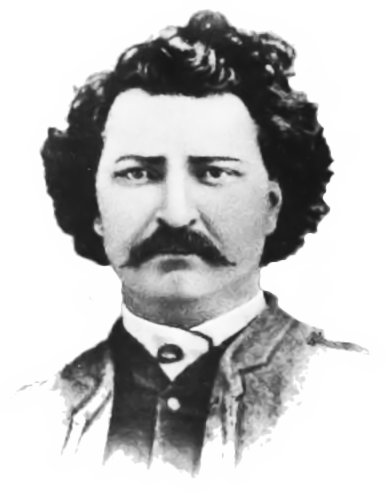Louis David Riel (1844-85) is widely recognized as a political leader of the Metis people of western Canada, a founding father of the province of Manitoba and leader of two rebellions. Less well-known are his messianic claims and his desires to change the Roman Catholic Church.
Riel was born into a prominent Metis family in the Red River Valley which at that time was claimed by the Hudsons’s Bay Company. He showed intellectual promise at an early age and was sent to Montreal to be trained for the Catholic priesthood but his father’s death, a broken romance and the first signs of incipient mental instability caused him to abandon Montreal for the United States and eventually a return to Manitoba in 1868.
The newly independent nation of Canada was arranging to acquire the vast land claims of the Hudson’s Bay Company, a move that caused unease in the Red River where inhabitants feared for their traditional holdings. A Canadian attempt to survey the territory in 1869 was met with local resistance led by Louis Riel who declared that no takeover of the area would be allowed unless the inhabitants were consulted. He was named head of a Provisional Government, dominated by Metis, and opposed by many recent settlers, mainly white Protestants. When fighting broke out between these two groups Riel had a number of his opponents arrested and executed one of them, Thomas Scott. Though the Canadian government agreed to the creation of a province of Manitoba, Riel fled the approach of an army expedition, fearing he would be punished for Scott’s death. Riel was eventually bribed with cash and an amnesty into accepting a five-year exile from Canada; he was denied the right to take up the seat in the House of Commons to which he had been elected several times.
In 1876 Riel’s mental troubles increased; he seems to have begun entertaining notions of a divinely-appointed role for himself — he signed himself “Prophet, Infallible Pontiff and Priest-King” — and was confined to an asylum for two years. On his release he journeyed to the American West where he settled in Montana, became a U.S. citizen and married. In 1884 he was summoned back to Canada by a delegation of Metis and white settlers in what is now Saskatchewan to help present their grievances to the Canadian government. Ottawa agreed to set up a commission to consider those complaints but Riel and some Metis considered this merely a delaying tactic.
Riel was by now convinced that he had been chosen by God to lead his people and began advancing wild religious views. He called himself the “Prophet of the New World”. The papacy, he said, should be moved to Montreal; Bishop Ignace Bourget of that city should become the pope (later he claimed that the village of St Boniface would house the papacy and Bishop Taché would be pope). The sun, moon and planets should be renamed, often after his family members; the names of the days of the week were changed to eliminate their pagan origins. He advocated a return to many Old Testament practices, including circumcision, a married clergy and polygamy. When protest broke out into open warfare, Riel’s prophetic utterances were followed by his military leaders as orders coming from God, though such divine advice did the rebels no good. The Northwest Rebellion was crushed, Riel was arrested and sentenced to death in 1885. Before his execution he abjured his heretical beliefs and received the last rites of the Catholic Church.
